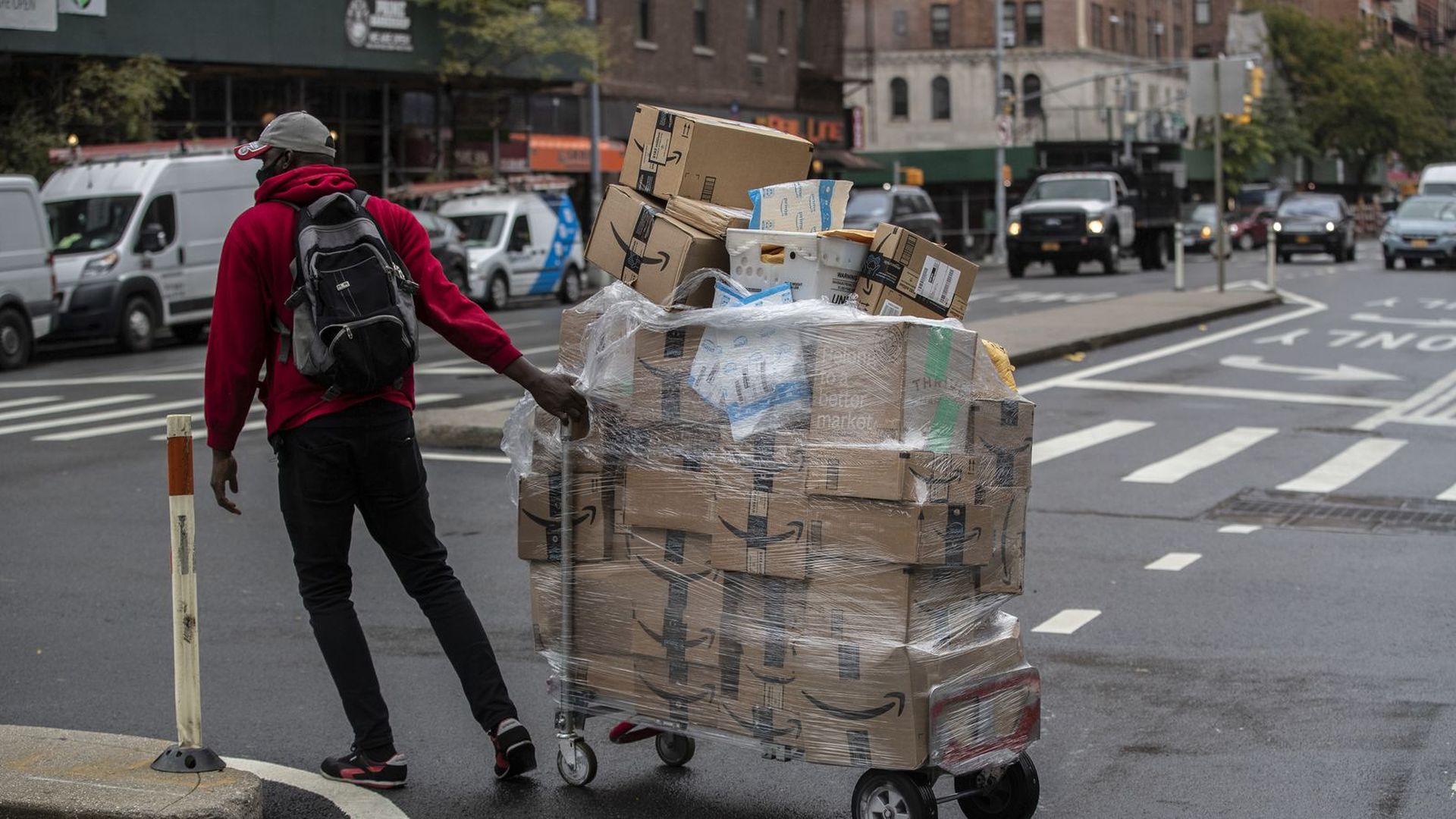| | | | | | | Presented By Divvy | | | | Login | | By Ina Fried ·Feb 17, 2021 | | Axios is launching its latest Get Smart video short course — this one on vaccines. Learn more about how vaccines work, how they're tested, and the challenges in distributing them — get your dose here. Today's Login is 1,276 words, a 5-minute read. | | | | | | 1 big thing: The important wireless merger you've never heard about |  | | | Illustration: Annelise Capossela/Axios | | | | It's largely flown under the radar, but Verizon's $6.2 billion bid to buy TracFone has raised concerns that the deal could cut off access to affordable mobile phone service, Axios' Margaret Harding McGill reports. The big picture: TracFone is one of the nation's largest providers of subsidized cell phone service for low-income people, an especially important program during the coronavirus pandemic — and one that Verizon hasn't traditionally focused on. Catch up quick: Verizon in September announced it would buy TracFone from billionaire Carlos Slim's América Móvil. - TracFone is the country's largest prepaid, no-contract wireless provider, with 21 million customers. It pays the major providers to use their networks to sell low-cost wireless service.
- In buying TracFone, Verizon says it wants to compete with AT&T and T-Mobile, which respectively own prepaid providers Cricket and MetroPCS.
Be smart: The lines are blurring between prepaid and "postpaid" cell service, which refers to paying at the end of the monthly billing cycle based on usage. Postpaid customers are historically seen as more lucrative because they are under a contract. - "Prepaid customers used to consume far less data than postpaid, and they paid a lot less," New Street analyst Spencer Kurn told Axios. "Now their usage is still lower, but not that much lower, and they're paying more. I think Verizon is looking at these prepaid subscribers as more attractive today than they would have 10 years ago."
What's happening: The Justice Department declined to dig deeper into the deal in November, signaling that it didn't raise competition concerns. But the Federal Communications Commission must also approve the deal. - Criticism has emerged from T-Mobile, Public Knowledge, and the Communications Workers of America.
- Several state attorneys general urged the FCC to thoroughly examine the merger, including its impact on Lifeline, a federal program that subsidizes phone or broadband service for low-income people.
By the numbers: TracFone has roughly 1.7 million Lifeline customers, but Verizon has not been a major player in the program. - "The concern is Verizon will prove to be unsuccessful in its efforts to run a Lifeline company and will just abandon the market," Public Knowledge senior vice president Harold Feld told Axios. "Nothing forces Verizon to continue to offer Lifeline service is the big problem. They say that they will, but they don't say for how long."
- The transaction would make Verizon the second big network operator to be heavily involved with Lifeline, after T-Mobile inherited a large Lifeline service through its acquisition of Sprint.
What they're saying: Verizon has previously called for the government to rethink its approach to affordable internet service, suggesting a new, permanent broadband benefit program of $20 to $50 per month for low-income consumers. - That's more than the $9.25 monthly subsidy provided by the Lifeline program, and Verizon's plan includes a federally funded electronic benefits card consumers could use to purchase broadband service.
- Separately, in response to criticism of its TracFone deal, Verizon told the FCC it will continue TracFone's Lifeline supported services.
What we're watching: People who are disproportionately hurt by the pandemic are the ones most likely in need of low-cost phone service to stay connected, so scrutiny will remain high even if the FCC approves the deal. |     | | | | | | 2. Epic's war with Apple expands to Europe | | Epic Games is going global in its legal battle against Apple, filing an antitrust complaint in Europe against the iPhone maker. Why it matters: The move adds another layer to the protracted dispute and brings it to a jurisdiction that has historically been tougher on U.S. tech companies. Catch up quick: Last September, Epic added its own in-app purchase mechanism to Fortnite, knowingly setting up a confrontation with Apple, which doesn't allow payment systems other than its own. Apple removed Fortnite from the App Store and Epic immediately filed suit. - A similar chain of events took place with Google on the Android side, though in that case, Epic can continue to distribute Fortnite on its own outside the Google Play store, while no similar option exists for iOS.
- Apple also countersued Epic in October, claiming breach of contract.
Between the lines: Europe uses different standards than the U.S. when it comes to antitrust issues, focusing more on harm to rivals than the U.S., which tends to focus more on the impact on consumers. - The complaint itself is confidential, but the EU already has a pending investigation into Apple.
What they're saying: Epic CEO Tim Sweeney said in a statement that Apple's practices are bad for both consumers and developers. "What's at stake here is the very future of mobile platforms." Sweeney said. "Consumers have the right to install apps from sources of their choosing and developers have the right to compete in a fair marketplace." |     | | | | | | 3. N.Y. sues Amazon over workers' COVID safety |  | | | A worker wheels a cart of Amazon packages during a delivery in New York in October. Photo: Victor J. Blue/Bloomberg via Getty Images | | | | New York Attorney General Letitia James filed a lawsuit against Amazon Tuesday night over its handling of worker safety during the pandemic, alleging the retail giant hasn't complied with workplace rules, Axios' Rebecca Falconer reports. Details: In the suit, James also alleges that Amazon illegally retaliated when employees expressed concerns about conditions last spring, when it fired an activist following a protest by workers at a warehouse on Staten Island. - "Amazon's flagrant disregard for health and safety requirements has threatened serious illness and grave harm to the thousands of workers in these facilities and poses a continued substantial and specific danger to the public health," James said in the suit.
For the record: Amazon filed a lawsuit against James last Friday in an attempt to stop her from suing the company, arguing that worker safety claims during the pandemic are federal matters, so she would be overstepping her authority to do so. Background: James began an investigation into Amazon following the Staten Island protest and the firing of organizers including Christian Smalls — who's seeking to lead a class-action lawsuit against the e-commerce firm. - James argued the state had codified the right to organize in its law so the company's action raised concerns about illegal retaliation.
The other side: Amazon spokesperson Kelly Nantel said in an emailed statement to Axios, "We care deeply about the health and safety of our employees, as demonstrated in our filing last week, and we don't believe the Attorney General's filing presents an accurate picture of Amazon's industry-leading response to the pandemic." |     | | | | | | A message from Divvy | | $400K credit lines right away | | |  | | | | Divvy can get you access to the capital your business needs with automated approvals of up to $400K and business credit lines ranging from $500-$5M—and a free platform to control your budgets, manage expenses, and more. Take advantage of our fast and flexible application today. | | | | | | 4. NYT's Nicole Perlroth on the cyber arms race | | Last year's SolarWinds hack of U.S. government and corporate information was the latest escalation in a digital battle that is expected to worsen, playing out in a global black market where governments can buy tools to hack everything from laptop cameras to power grids. On the Axios Re:Cap podcast, Dan Primack went deeper with Nicole Perlroth, a New York Times cybersecurity reporter who just published a book titled "This Is How They Tell Me The World Ends." Big money is changing hands in this world, Perlroth says. She told Dan that the going rate to hack into his iPhone would be $2.5 million, perhaps as much as $3 million if the customers were from Saudi Arabia or the UAE. My thought bubble: I can imagine some VCs might want to know who is in Dan's contact list, too, but not sure they would cough up that much. Between the lines: For years the National Security Agency relied on its own hackers, but these days the NSA and other U.S. government agencies are also paying for computer and phone hacks. - Perlroth said the willingness to pay came as different agencies realized that purchasing an unpatched "zero-day" vulnerability could net them valuable intelligence and eventually help them win bigger budgets.
The big picture: As for how the U.S. can defend against hacks, Perlroth says better deterrence can help, but that hasn't proven sufficient. She suggested other options include providing incentives to businesses to upgrade older, vulnerable systems as well as penalties for those that don't. - "We are at a point now where the cost of doing nothing is much higher than the cost of doing something," Perlroth said.
Go deeper: The full podcast is worth a listen and can be found here. |     | | | | | | 5. Take note | | On Tap ICYMI |     | | | | | | 6. After you Login | | Levi's is collaborating with Nintendo on a Pokemon tuxedo. If that's not quite your thing, there's actually a whole collection with jeans, tees, sweatshirts and accessories. |     | | | | | | A message from Divvy | | Keep track of every dime spent | | |  | | | | Ready to bring back control into your business finances? Start using Divvy, a business credit card and expense management platform, before the end of the month and receive an extra 1% cash back on every purchase you make in March. Take advantage of this. | | | | | | Axios thanks our partners for supporting our newsletters.
Sponsorship has no influence on editorial content. Axios, 3100 Clarendon Blvd, Suite 1300, Arlington VA 22201 | | | You received this email because you signed up for newsletters from Axios.
Change your preferences or unsubscribe here. | | | Was this email forwarded to you?
Sign up now to get Axios in your inbox. | | | | Follow Axios on social media:    | | | | | |






No comments:
Post a Comment